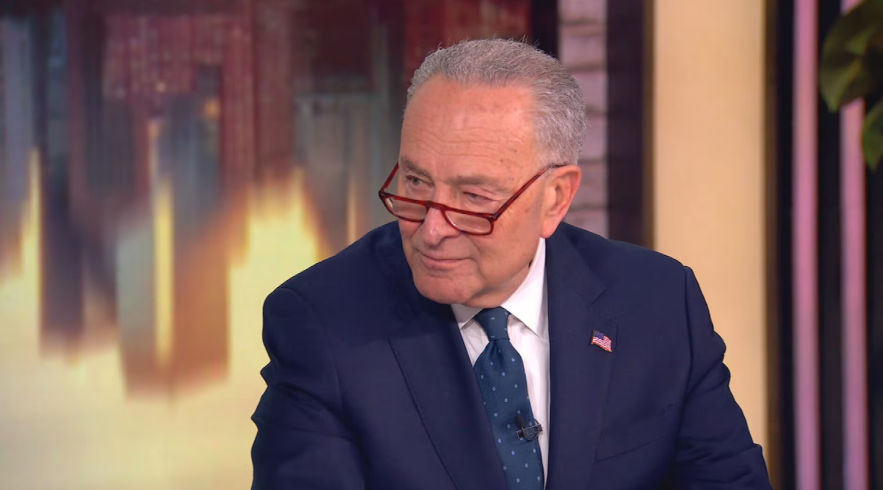NOTE: VIDEO AT THE END OF ARTICLE
Senate Drama Unfolds as Schumer Stalls Trump’s “Big, Beautiful Bill”
In a rare procedural twist, Senate Minority Leader Chuck Schumer (D-N.Y.) brought the legislative process to a crawl over the weekend by deploying a seldom-used delay tactic. The move stalled momentum on President Donald Trump’s highly touted “Big, Beautiful Bill.”
On Saturday, Schumer demanded that Senate clerks read the full 940-page bill aloud—an ordeal that lasted nearly 16 hours and bled into Sunday morning. While the bill enjoys strong support from Senate Republicans, the delay showcased just how divided the chamber remains over its content and direction.
A Deliberate Move to Put Pressure on the GOP
Before the procedural vote, Schumer made it clear that his goal was to draw attention to the bill’s length and complexity. “Republicans are squirming,” he posted on X (formerly Twitter), “because they haven’t even read it.”
He added, “We’re going to make sure they do.”
Though critics pointed out the hypocrisy—Democrats often pass lengthy bills without reading them either—Schumer’s move grabbed national headlines and delayed the legislative timeline Republicans had hoped to fast-track.
Next Steps: Debate Begins, GOP Faces Internal Friction
Now that the reading is over, the Senate will begin a mandatory 20-hour debate period, split evenly between Democrats and Republicans. Democrats plan to use all of their time. Republicans, however, may only speak for a few hours—though internal opposition within the GOP could prolong discussions.
Senator Rand Paul (R-Ky.) remains one of the loudest critics. While he hasn’t completely ruled out voting for the bill, he questions whether it goes far enough in addressing long-term spending reforms.
Medicaid Provisions Stir Controversy
Another flashpoint is the bill’s Medicaid components. Senator Thom Tillis (R-N.C.) has refused to support the bill unless major changes are made. He has also announced plans to retire after his current term, making him less susceptible to political pressure—including from Trump himself.
Senator Susan Collins (R-Maine), who supported the bill in its early stages, has also called for revisions. She’s especially concerned about changes to the Medicaid provider tax rate, a sensitive issue in states like hers.
Fiscal Conservatives Push for FMAP Reform
A group of fiscal conservatives has been working behind the scenes with Senate Majority Leader John Thune (R-S.D.) and Vice President J.D. Vance. Their aim is to secure changes to the Federal Medical Assistance Percentage (FMAP), which determines how much federal money goes to state Medicaid programs.
Most Senate Republicans oppose modifying FMAP. However, this bloc argues that deeper spending cuts are necessary to make the bill fiscally responsible.
Trump and Allies Claim a Win—But Challenges Remain
Despite these hurdles, President Trump praised Saturday’s four-hour voting session. The procedural win allows the bill to move forward for full debate.
Senator Ron Johnson (R-Wis.)—who changed his vote from ‘no’ to ‘yes’—called the bill a “necessary first step” toward restoring fiscal balance. He added, “Biden and the Democrats left us with open borders, conflicts, and massive deficits. This bill begins to address all of that.”
The vote passed narrowly, 51–49, with Tillis and Paul dissenting. Republicans currently hold a 53–47 majority, but whether that margin will hold for the final vote remains to be seen.

Sarah Mitchell is a bestselling novelist recognized for her insightful and emotionally resonant stories that explore the complexities of human relationships. Originally from Denver, Colorado, Sarah grew up in a family of teachers who nurtured her curiosity and love for storytelling. She studied psychology at Stanford University, where she became fascinated by the intricacies of human behavior—an interest that would later shape her writing career. Sarah’s novels are praised for their nuanced characters, intricate plots, and ability to capture the subtle tensions that define love, friendship, and family ties. Her breakthrough novel, The Spaces Between Us, became an instant bestseller, lauded for its honest portrayal of strained family relationships and the fragile bonds that hold people together. Since then, she has published several works that continue to captivate audiences around the world. Outside of her writing career, Sarah is passionate about mental health advocacy and often partners with organizations to promote awareness and support for those struggling with emotional well-being. Her personal life is quieter—she enjoys hiking in the Colorado mountains, practicing yoga, and spending time with close friends. With each new book, Sarah Mitchell cements her reputation as a writer who illuminates the beauty and struggles of human connection.








